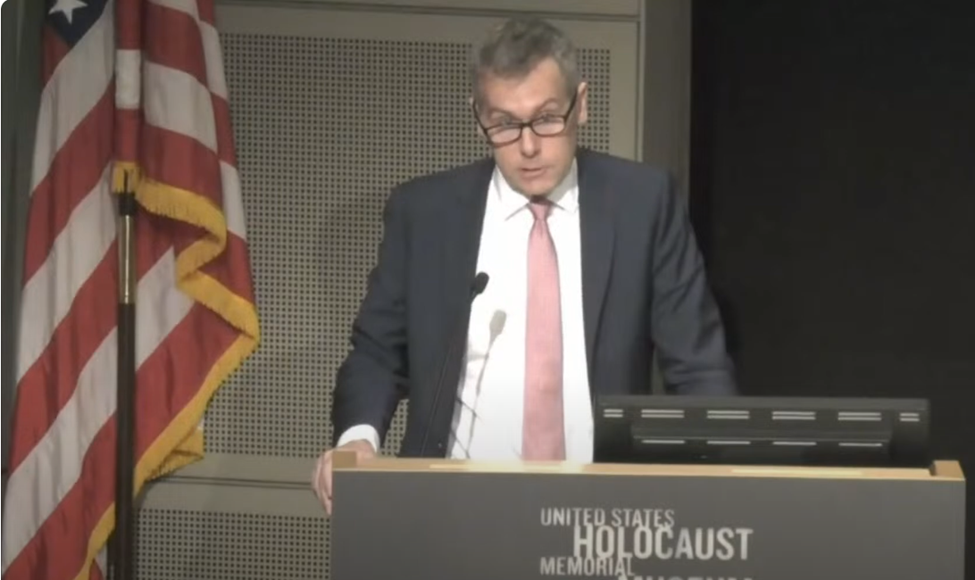I was honored to be among the speakers this week at the United States Holocaust Memorial Museum on March 5, 2024. Convened by the World Jewish Restitution Organization and the U.S. State Department, the event announced the Best Practices for the Washington Conference Principles on Nazi-Confiscated Art (available here), and a report (available here) by the WJRO on the status of restitution progress worldwide. The Best Practices were a collaboration by the network of Special Envoys on Holocaust issues, in recognition of the 25th anniversary of the Washington Conference Principles on Nazi-Confiscated Art in 1998.
Best Practices for Nazi-Era Art Presented at Special Event in Washington
Topics: Washington Principles on Nazi-Confiscated Art, 1998 Washington Conference on Holocaust-Era Assets, WJRO, State Department, Leiden University, Stuart Eizenstat, Claims Conference, Antony J. Blinken, Gideon Taylor, Colette Avital, Michael Herzog, Ellen Germain, Dr. Wesley Fisher, Dr. Ruth J. Weinberger, Prof. Dr. Meike Hopp, Technische Universität Berlin, Lord Eric Pickles, Prof. Leora Bilsky, Tel Aviv University, Dr. Evelien Campfens
Van Gogh Dispute and Temporary Exhibition Loan Collide at Detroit Institute of Arts
A new lawsuit seeking to seize a painting by Van Gogh currently at the Detroit Institute of Arts for the show “Van Gogh in America,” a painting which the plaintiff alleges was unlawfully taken has brought back into focus the law in the United States that address immunity from seizure. That is to say, what are the circumstances under which a work of art loaned on exhibition—even if stolen property—might nonetheless have to be returned to the lender? The results, and the criteria, are often surprising to the casual viewer but are important to review for museums, collectors, and anyone involved in art loans.
Topics: Malevich, Schiele, 22 U.S.C. § 2459, Pinacoteca di Brera, Museum of Modern Art, Van Gogh, IFSA, Leopold Collection, Portrait of Wally, Immunity from Seizure Act, State Department, Detroit Institute of Art, Brokerarte Capital Partners LLC, The Reading Lady, Liseuse De Romans, George Caram Steeh, Gustavo Soter, The Novel Reader, replevin
New Law Requires Museums in New York to Display Information About Nazi Art Looting, May be More Complicated than it Looks
New York Governor Kathy Hochul has signed into law a new requirement requiring museums to indicate publicly any object in their collection that was displaced by the Nazis as part of what Congress has rightly called the largest organized theft of art in human history. The significance of this new rule is clear: New York is the center of the art world, and its museums hold a unique place of prominence. As readers of this blog or of my book A Tragic Fate-Law and Ethics in the Battle Over Nazi-Looted Art know, my view has long been that American museums vary widely in their candor and proactive approach to the issue of Nazi-looted art in their collections. Many have shown admirable initiative in probing their collections, while others have shown a regrettable passivity in waiting to receive and then deflect claims. Whether this bill will move the needle on that balance is the question. Transparency and disclosure have been the defining goals of the modern restitution era. This new law serves many of those ideals, but some unintended consequences may follow.
Topics: Metropolitan Museum of Art, American Alliance of Museums, Nazi-looted art, Foreign Sovereign Immunities Act, Washington Conference on Holocaust Era Assets, Supreme Court, Washington Principles on Nazi-Confiscated Art, AAM, Museum of Modern Art, Nuremberg race laws, Washington Conference Principles on Nazi-Stolen Ar, Association of Art Museum Directors, Washington Department of Labor and Industries, Solomon R. Guggenheim Museum, Museum of Fine Arts Boston, AAMD, Military Government Law 59, State Department, Holocaust Expropriated Art Recovery Act, HEAR Act, A Tragic Fate, Law and Ethics in the Battle Over Nazi-Looted Art, Governor Kathy Hochul, Reich Citizenship Law, Animal House, Kevin Bacon
U.S. Supreme Court Will Hear Germany’s Appeal to Keep the Guelph Treasure, Taken by Nazi Agents in 1935
(WASHINGTON-July 2, 2020) The United States Supreme Court today agreed to hear the appeal by Germany and the Stiftung Preussischer Kulturbesitz (SPK) seeking to dismiss the restitution claim by the heirs to the so-called Guelph Treasure (known in German as the Welfenschatz). The claims arise out of the forced transfer in 1935 of the Guelph Treasure by a consortium of Jewish art dealers to agents of Hermann Goering, who personally presented it as a gift to Hitler. In 2018, the Court of Appeals for the D.C. Circuit held that U.S. courts have jurisdiction over the claim under the Foreign Sovereign Immunities Act of 1976 (FSIA). That appellate court had rejected the Defendants’ arguments that U.S. courts lack jurisdiction, and that Germany’s treatment of its Jews in the 1930s should be immune from judicial scrutiny.
Sullivan partner Nicholas M. O’Donnell said, “we are grateful for the opportunity to address the Supreme Court on these important questions about holding Germany accountable for its Nazi-looted art. A 1935 transfer from German Jews to notorious art looter and war criminal Hermann Goering is the quintessential crime against international law, regardless of Germany’s Holocaust distortion in defending this case. Germany seeks to eliminate recourse for Nazi-looted art and the Court will have the chance to answer this question of critical importance for Holocaust victims.” O’Donnell added, “this is also an opportunity to rebuke the Department of Justice and State Department, who turned their back on decades of U.S. policy by siding with Germany’s effort to keep Nazi-looted art.”
Topics: United States Supreme Court, Nazi-looted art, Department of Justice, SPK, Stiftung Preussischer Kulturbesitz, Hermann Goering, NS Raubkunst, Gerald Stiebel, Prussian Cultural Heritage Foundation, Federal Republic of Germany, Alan Philipp, Welfenschatz, State Department, Paul Körner, Jed Leiber
Guelph Treasure Heirs Respond to U.S. Brief that Argued Nazi Art Theft Was a Domestic Affair
On behalf of my clients seeking restitution of the Guelph Treasure, or Welfenschatz, we filed today our supplemental brief with the U.S. Supreme Court in response to the Brief of the United States as Amicus Curiae that the Solicitor General’s office submitted on May 26, 2020. You can read today’s brief here, and read more about the particular problems with the Solicitor General’s filing here, most notably the contention that the Nazis’ property crimes against German Jews should be considered a “domestic” issue that doesn’t implicate international law under the Foreign Sovereign Immunities Act (FSIA). It was particularly distressing that the brief was signed not only by the U.S. Department of Justice, but also the State Department.
The filing follows an increasing pattern of disregard for bipartisan Congressional action, in this case the 2016 Holocaust Expropriated Art Recovery Act. Similarly, the 2017 Justice for Uncompensated Survivors Act that was enacted specifically to counter Poland’s and others’ hostility to restitution for Holocaust era assets has been ignored. The JUST Act required that the State Department issue a report on other countries’ restitution progress no later that November 9, 2019, yet no report has been issued. The State Department has a dedicated page on the JUST Act...which simply lists the law (Poland's embassy has its own rather self-serving version too). Something very curious is going on with restitution at the State Department, all the more heartbreaking given the 80 years of leadership on the topic by the United States.
Topics: Foreign Sovereign Immunities Act, Supreme Court, SPK, Stiftung Preussischer Kulturbesitz, FSIA, Welfenschatz, State Department, HEAR Act, JUST Act, solicitor general
Foreign Cultural Exchange Jurisdictional Clarification Act and the Immunity from Seizure Act—Status Quo Is Often Misunderstood
There has been additional commentary in the last week on the Foreign Cultural Exchange Jurisdictional Clarification Act, including this piece at Hyperallergic in which I’m quoted. The piece reminds me to revisit a confusing subject latent in the whole discussion: immunity from suit versus immunity from seizure. Despite what one frequently reads, the current bill would have no effect at all on immunity from seizure, which seems to be most people’s concern. It would affect only a small category of exceptions for immunity from suit, that is, who can be sued, not what can be loaned into the United States.
Topics: Foreign Cultural Exchange Jurisdictional Clarifica, Amsterdam, Thyssen-Bornemisza Collection, U.S. Federal Republic of Germany, Foreign Sovereign Immunities Act, FSIA, Restitution, Kingdom of Spain, IFSA, Foreign Sovereign Immunities, Immunity from Seizure Act, Museums, 28 U.S.C. § 1605, Foreign Cultural Exchange Jurisdictional Immunity, State Department
Immunity from Seizure in Focus—Loans from Cuba for Exhibitions on Hold
A recent story in The Art Newspaper spotlights a number of lingering issues related to stolen art, the power of U.S. courts to seize property to satisfy liability, and the role of the Immunity from Seizure Act, 22 U.S.C. § 2459 (IFSA). As we discussed recently, the prospect of a material change in U.S.-Cuba relations, which as a commercial matter haven’t existed for more than 50 years, has broad implications for the art market. Just as importantly, there are many, many unanswered questions about the fate of property in Cuba that changed hands or was nationalized as part of the Cuban Revolution in the late 1950s and onward. Simply put, there are thousands of claims worth billions of dollars for all sorts of property that exiles left behind or had taken from them. While it is still a long way off, one impact of potentially normalized relations is the prospect of sorting through those claims.
Topics: Legislation, Malevich, Atlanta, Boston College Law School, The Art Newspaper, Immunity from Seizure, Foreign Sovereign Immunities Act, Wifredo Lam: Imagining New Worlds, 22 U.S.C. § 2459, City of Amsterdam, High Museum, McMullen Museum at Boston College, IFSA, Foreign Sovereign Immunities, Portrait of Wally, Immunity from Seizure Act, Museums, Chabad, Foreign Cultural Exchange Jurisdictional Immunity, State Department, Cuba
Changes in U.S. Law Regarding Cuba Will Affect the Arts
This week’s biggest news story (apart from Above the Law’s Awesome Law Blogs of 2014) is the historic reopening of diplomatic relations between the United States and Cuba after more than fifty years. Like a coda to the end of the Cold War, we all found ourselves watching the President of the United States describing how there will once again be a U.S. embassy in Cuba. For those of us who have not been alive as long as diplomatic ties have been severed and the Castro regime has been in place, it was a remarkable sight indeed.
Topics: Castro, Sudan, Gabriela Rangel, Auctions, U.S. Treasury’s Office of Foreign Assets Control, President of the United States, OFAC, Above the Law, Congress, Art Basel Miami Beach, North Korea, economic embargo of Cuba, Galleries, Wall Street Journal, President Obama, Art Fairs, State Sponsor of Terrorism List, Cuban peso, the Americas Society, 12 Awesome Law Blogs of 2014, Iran, ArtNet, Syria, Foreign Affairs, Art Law Report, State Department, Cuba, Cold War
Foreign Cultural Exchange Jurisdictional Immunity Clarification Act: House Votes to Amend FSIA to Exclude Artwork Loan as Basis for Jurisdiction
The House of Representatives approved the Foreign Cultural Exchange Jurisdictional Immunity Clarification Act on March 19, 2012, to remove the display of a work of art in the United States as basis to sue a foreign sovereign here. The law touches on important distinctions between immunity from suit—when a party cannot be sued at all—from immunity from seizure—when a particular object or asset cannot be seized.
Topics: Legislation, Immunity from Seizure, FSIA, Restitution, Senate Bill 2212, World War II, Foreign Sovereign Immunities, House of Representatives, Foreign Cultural Exchange Jurisdictional Immunity, State Department





